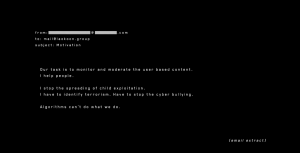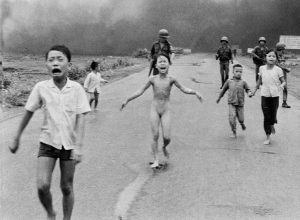In 2017, Mark Zuckerberg said in his speech that Facebook will move beyond connecting family and friends to building “social infrastructure” critical to bringing people together in a “global community” for “supporting us, keeping us safe, for informing us, for civic engagement and for inclusion of everyone” (Zuckerberg, 2017). For many years, Zuckerberg insisted that since Facebook is “platform for all ideas” (Zuckerberg, 2018). As a result, this recognition has caused great trouble to Facebook, and it has been criticized for content regulation over these years.
Indeed, early Internet governance stressed moral self-discipline and pushed for network neutrality and network liberalism. This gave rise to Internet fundamentalism: let the globe be free of information inequity, and allow any information reach the whole world in a barrier-free and unrestricted manner. Everyone will become a part of the great unity of the world.However, with the continual broadcast of unlawful and dangerous information, cybercrime and piracy have become increasingly common, and the need for substantially enhancing network monitoring has become the norm.
According to Chicago police, a 15-year-old girl was sexually attacked by multiple assailants, and up to 40 people witnessed the incident live on Facebook Live in 2017 (Helling, 2017). The public and public opinion have prompted Facebook to repeatedly upgrade its censorship system and constantly adjust the balance between free expression and extremist speech. For this purpose, Zuckerberg (2018) announced that Facebook has implemented fact checking, employed additional specialists, and increased efforts to build algorithms for AI censorship and content moderation. However, a documentary published in 2018 showed the people behind the algorithms as well as specialists who are truly opposed to the evil side of the globe.
Many companies recognized the significance of content filtering long before Facebook. It has attempted to block child pornography, extreme information, fake news, pranks, and other unpleasant messages while allowing other forms of information to spread. However, it is a team of actual censors, not the company’s professed specialists and AI algorithms, who are in charge of content moderation. These so-called Internet cleaners were the subject of this documentary. They work for the world’s largest social networking site, Facebook, or Google, the world’s largest search engine. They are not employees of the above companies, but rather outsourced staff for a Philippine third party auditing firm (Block & Riesewieck, 2018).

“Capturing them is not an easy process. Facebook, Twitter, and other companies engage outsourcing firms in Manila, utilize codewords, and even use retribution and coercion to keep thousands of employees from revealing their employers “said the director. As a result, several of the interviewers who came on the scene used pseudonym and showed their backs. The job of Internet censors cannot be publicized, and this group of people was formerly secret. Some of them must examine 25,000 pieces of content every day, and some commit suicide because they cannot withstand violent content and job pressure.
A female moderator who was assigned to review pornographic content had no idea what she was going to review. And now, this “porn identification officer” has learned all kinds of words and slang about genitals in English, and then has thoroughly studied the anatomy of men and women as well as numerous undesirable sexual addictions. After get off work, she has to go to an adult store to learn about new products. Only in this way can she make no mistakes when reviewing pornographic content. The documentary “The Cleaners” claims that they only have three opportunities each month to make a mistake before they are fired (Block & Riesewieck, 2018).

In the face of the indescribable negative content on the Internet, many Internet moderators can’t stand it. Some of them had post-traumatic stress disorder (PTSD). Every day, they are exposed to extreme information, and some employees have begun to be brainwashed by these fringe beliefs. In the office, one employee supported the “Flat Earth” while another former employee said that he “no longer believes that 9/11 is a terrorist attack”(Newton, 2019). His work has progressively shifted his worldview. In The Verge’s report, company provides employees with some ways to reduce work pressure. They provide on-site psychological counselors and employee assistance courses. However, the majority of the employees polled thought that these resources were insufficient. They de-stress by smoking week in their break.
The director of “The Cleaners” illustrated the examiner’s “misjudgment” process. He purposefully requested that the censors assess the images in the Vietnam War event. As a consequence, censors who were unfamiliar with the relevant background concluded that the images depicted an ISIS fighter torturing detainees and asked that the picture should be removed. It’s worth noting that Facebook once “incorrectly removed” an iconic anti-Vietnam War photograph shot on the platform. The little girl in the photo was burnt by a gasoline bomb launched by the South Vietnamese Air Force. She ran away and wailed in terror. She is completely nude. As a result, several parties condemned Facebook. Later, the platform changed its review standards to allow “newsworthy” nudity under the “anti-war” concept, “unless accompanied by a violating caption or shared in a violating context” (Facebook, 2021). Additionally, Facebook vice president Justin Osofsky said Some photos may be “offensive” in one area of the globe but acceptable in another, and they will continue “listening” community and “evolve” (Tarleton, 2018).

Individual speech in the public is highly valued in the United States. The Constitution provides broad safeguards for all forms of expression, not just political speech. Likewise, the First Amendment (1791) protects the freedom to hear the speech of others. There are a few limitations to these universal speech privileges recognized by American law. Aside from these limitations, speech by and for social media users may be assumed to be unregulated by the government. For many years, legal scholars felt that commercial speech was subject to fewer restrictions from the government than political or creative expression.
People are concerned about whether the government should expand its control over online speech in order to accomplish national security. That question often revolves around the connection between words and violence. However, additional issues of national security may be involved in online discourse.
Terrorism. Attacks on or occupation of the country or its inhabitants are the most obvious illustration of a danger to national security. Terrorism is described as the use of public violence toward a political, social, or religious cause or ideology (Berger, 2018). Although speech is not violence, a speaker may aim to provoke a violent or unlawful action that is likely to occur as a result of the speech. The First Amendment does not protect such speech, and the government may intervene to prohibit or penalize it. As a result, the government cannot punish such speech in a way that is compatible with the First Amendment. Terrorist speech that attempts to convince rather than direct attack would mostly certainly be uncensored.
Social media platforms have anti-terrorist speech rules. For instance, YouTube’s (2021) policy on terrorist content states: We do not allow terrorist groups to utilize YouTube for any purpose, including recruitment. YouTube also rigorously forbids terrorism-related content, such as content that supports terrorist actions, incites violence, or celebrates terrorist incidents. Similar restrictions exist on Facebook (2021), however they seek to limit the subjectivity of terrorism by linking it to violence against people. According to Twitter’s policies, people may not make specific threats of violence. Threatening or encouraging terrorism is one example, but it is not the only one. People also cannot join the organizations that utilize or advocate violence against civilians to achieve their goals, whether via their own words or action on or off the site.
Increases in government authority may be less targeted and effective than social media moderation. However, that efficacy might have been gained by limiting the types of speech heard on such platforms. However, people estimate that the scope has been reduced and the reasons for increasing government power are unproven. People’s desire to involve the government in online speech debates is reasonable, but misguided. Giving such authority would undermine free expression and the independence of the private sector. People have seen that these digital businesses are dealing with many of the issues raised by those advocating for government intervention. The enterprises are considerably more technologically advanced and hence far more capable of handling with these problems. Of course, the companies’ actions may merit scrutiny and criticism now and in the future. However, for the time being, a rational individual can see potential in their efforts.